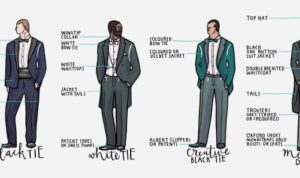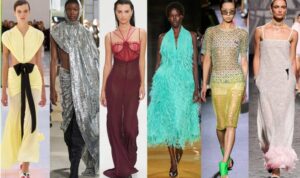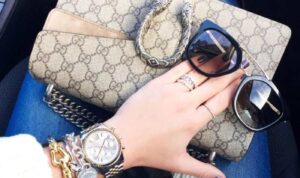Luxury fashion brands exude sophistication and exclusivity, setting the standard for high-end style and opulence. From iconic names to cutting-edge designs, this captivating world of luxury fashion is a realm of creativity and elegance that continues to shape the global fashion landscape.
Overview of Luxury Fashion Brands
Luxury fashion brands are known for their high-quality, exclusive, and prestigious clothing and accessories. These brands often have a rich history, exceptional craftsmanship, and a strong focus on superior design. They cater to a wealthy clientele who value luxury, sophistication, and status.
Well-known Luxury Fashion Brands
- Chanel
- Louis Vuitton
- Gucci
- Prada
- Hermès
Characteristics of Luxury Fashion Brands
Luxury fashion brands are characterized by the following:
- Exclusivity: Limited production and distribution to maintain prestige.
- Quality: Use of high-quality materials and expert craftsmanship.
- Heritage: Rich history and tradition of the brand.
- Prestige: Associated with luxury, sophistication, and status.
- Price: High price point reflecting the brand’s exclusivity and quality.
History and Evolution
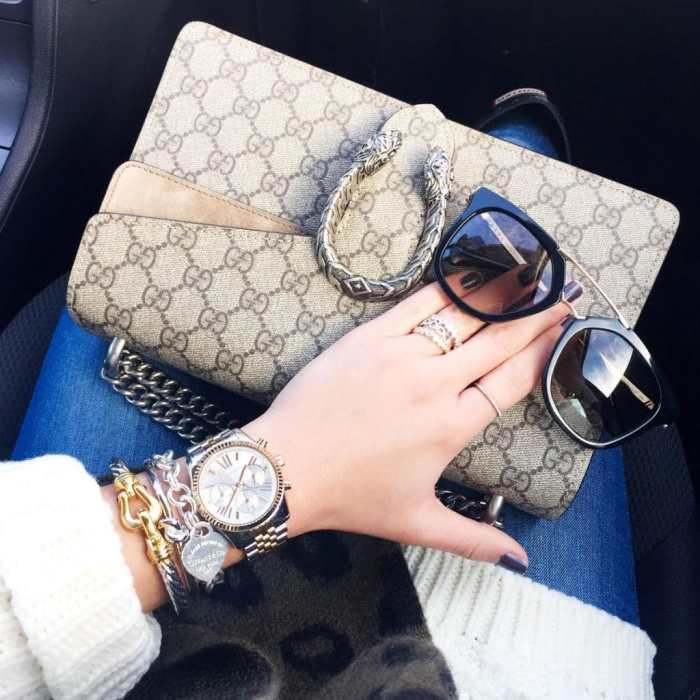
Luxury fashion brands have a rich history dating back centuries, originating from the luxurious garments worn by royalty and aristocrats. Over time, these brands have evolved to cater to a wider audience while maintaining their exclusivity and premium status.
Origins of Luxury Fashion Brands
Luxury fashion brands can trace their roots to the European courts of the 17th and 18th centuries, where skilled artisans created exquisite garments for the nobility. These early brands were known for their impeccable craftsmanship and use of the finest materials, setting the foundation for the luxury fashion industry we know today.
Evolution of Luxury Fashion
As industrialization took hold in the 19th century, luxury fashion brands began to expand their reach by producing ready-to-wear collections for a growing middle class. This shift democratized luxury fashion to some extent, making high-end designs more accessible to a broader audience. However, these brands still maintained their aura of exclusivity through limited editions and high price points.
Key Milestones in Luxury Fashion
– In the early 20th century, iconic luxury fashion houses like Chanel and Louis Vuitton emerged, revolutionizing the industry with their innovative designs and marketing strategies.
– The post-World War II era saw a surge in demand for luxury goods, leading to the rise of new luxury fashion brands such as Dior and Givenchy.
– In recent decades, luxury fashion brands have adapted to the digital age by embracing e-commerce and social media, expanding their global reach and connecting with a new generation of consumers.
Brand Identity and Values
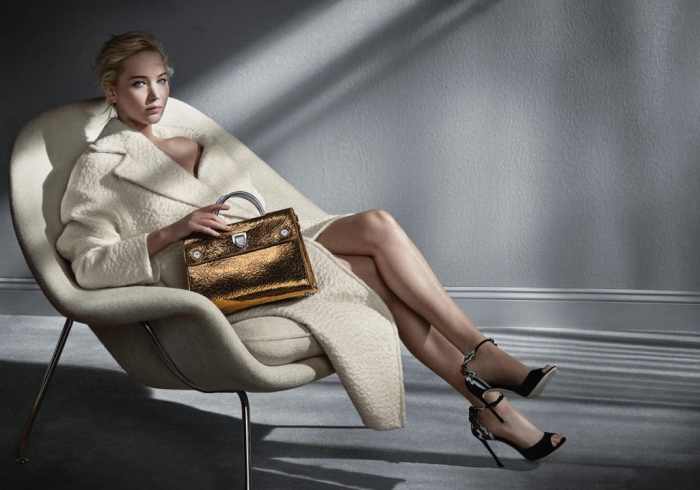
In the world of luxury fashion brands, establishing a strong brand identity is crucial for standing out in a highly competitive market. This identity encompasses the unique characteristics, values, and image that define a brand and differentiate it from others.
Importance of Brand Identity
Brand identity serves as the foundation for luxury fashion brands, shaping how they are perceived by consumers and setting the tone for their products, marketing campaigns, and overall brand experience. It helps create a sense of exclusivity, sophistication, and prestige that resonates with the target audience.
Values of Luxury Fashion Brands
- Luxury fashion brands typically embody values such as craftsmanship, quality, exclusivity, and heritage. These values are reflected in the materials used, the attention to detail in design, and the rich history that each brand carries.
- Another key value is innovation, as luxury fashion brands strive to push boundaries and set trends in the industry. This commitment to creativity and forward-thinking sets them apart from mass-market brands.
- Sustainability and ethical practices have become increasingly important values for luxury fashion brands, as consumers are more conscious of the environmental and social impact of their purchases. Brands are now incorporating sustainable practices into their supply chain and production processes.
Communicating Identity and Values
Luxury fashion brands communicate their identity and values to consumers through various channels, including brand messaging, marketing campaigns, product design, and collaborations with influencers and celebrities. They also use exclusive events, fashion shows, and flagship stores to create a unique brand experience that reinforces their identity and values.
Design and Innovation
In the world of luxury fashion brands, design and innovation play a crucial role in setting them apart from the rest. The ability to create unique and trend-setting designs while incorporating innovative techniques is what keeps these brands at the top of the industry.
Innovative Designs
Luxury fashion brands are known for pushing the boundaries of design and creating pieces that are not only visually stunning but also technologically advanced. For example, Louis Vuitton’s collaboration with artist Jeff Koons resulted in a collection of handbags featuring famous works of art. This fusion of art and fashion showcased the brand’s innovative approach to design.
Role of Design
Design is at the core of luxury fashion brands, defining their aesthetic and setting them apart from mass-market brands. Brands like Gucci under the creative direction of Alessandro Michele have embraced bold and eclectic designs, redefining the traditional notions of luxury fashion. This emphasis on unique design elements has garnered a loyal following and cemented Gucci’s position as a luxury powerhouse.
Innovation for Success
Innovation is a driving force behind the success of luxury fashion brands. Whether it’s experimenting with sustainable materials, introducing new production techniques, or incorporating cutting-edge technology into their designs, brands like Chanel and Prada are constantly pushing the boundaries of innovation. This commitment to innovation not only keeps the brands relevant but also ensures they stay ahead of the competition.
Marketing Strategies: Luxury Fashion Brands
Luxury fashion brands employ a variety of marketing strategies to maintain their exclusivity while expanding their reach to a wider audience. These strategies are carefully crafted to appeal to their target market and uphold the brand’s reputation for luxury and quality.
Exclusivity through Limited Editions
Luxury fashion brands often release limited edition collections to create a sense of exclusivity and scarcity among consumers. These limited editions are highly coveted and can drive up demand for the brand’s products.
Collaborations with Influencers and Celebrities
Many luxury fashion brands collaborate with influencers and celebrities to reach a wider audience and attract new customers. By partnering with popular figures, these brands can leverage their influence and reach to promote their products to a larger audience.
Omnichannel Marketing
Luxury fashion brands utilize omnichannel marketing strategies to create a seamless shopping experience for their customers across online and offline channels. This approach allows customers to engage with the brand through multiple touchpoints, from social media to physical stores, enhancing brand visibility and accessibility.
Storytelling and Brand Heritage
Luxury fashion brands often leverage storytelling and their rich brand heritage to connect with consumers on a deeper level. By sharing the history and values of the brand, these companies can build emotional connections with customers and differentiate themselves in a crowded market.
Personalized Customer Experiences
Luxury fashion brands prioritize personalized customer experiences to cater to the unique preferences and tastes of their clientele. By offering personalized styling services, VIP events, and exclusive perks, these brands can cultivate long-lasting relationships with their customers and foster brand loyalty.
Sustainability Practices
In today’s fashion industry, sustainability is becoming increasingly important, even for luxury brands. These brands are taking steps to implement sustainable practices in their operations to reduce their environmental impact and promote ethical practices. Let’s delve into the sustainability initiatives of luxury fashion brands and their impact on brand reputation.
Sustainable Materials and Sourcing
Luxury fashion brands are now focusing on using sustainable materials such as organic cotton, recycled polyester, and alternative materials like Tencel and Piñatex. By sourcing materials responsibly, these brands are reducing their carbon footprint and promoting ethical practices in the industry.
Ethical Production and Supply Chain
Many luxury fashion brands are also ensuring ethical production practices by partnering with suppliers who provide fair wages and safe working conditions for their employees. By maintaining transparency in their supply chain, these brands are building trust with consumers who value ethical practices.
Circular Fashion Economy
Some luxury fashion brands are exploring the concept of a circular fashion economy where products are designed to be recycled, upcycled, or biodegradable. By implementing take-back programs and recycling initiatives, these brands are reducing waste and promoting a more sustainable approach to fashion.
Challenges and Opportunities, Luxury fashion brands
While implementing sustainability practices in the luxury fashion industry comes with its challenges, such as higher costs and complexities in the supply chain, it also presents opportunities for brands to differentiate themselves in the market and attract environmentally conscious consumers. By overcoming these challenges, luxury fashion brands can enhance their reputation and contribute to a more sustainable future for the industry.
Celebrity Collaborations
Collaborations with celebrities play a significant role in the luxury fashion industry, as they bring together the worlds of entertainment and high-end fashion. These partnerships not only create buzz and excitement around a brand but also help to reach a wider audience and attract new customers.
Examples of Successful Celebrity Collaborations
- Louis Vuitton x Supreme: The collaboration between Louis Vuitton and streetwear brand Supreme created a frenzy in the fashion world, combining luxury and urban style.
- Gucci x Dapper Dan: Gucci’s collaboration with Harlem couturier Dapper Dan resulted in a collection that paid homage to his iconic designs, blending high fashion with streetwear.
- Balmain x Beyoncé: Beyoncé’s collaboration with Balmain for her Coachella performance brought together her unique style with the luxury brand’s aesthetic, creating a memorable and impactful collection.
Influence on Brand Image and Consumer Perception
Celebrity partnerships have a profound impact on a brand’s image and consumer perception. By associating with well-known personalities, luxury fashion brands can enhance their prestige, relevance, and desirability. Consumers often view these collaborations as exclusive and aspirational, leading to increased brand loyalty and engagement. Additionally, celebrity endorsements can help broaden a brand’s reach and appeal to a diverse audience, including younger consumers who are influenced by popular culture and social media trends.
